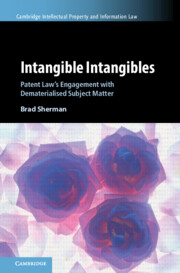Refine search
Actions for selected content:
4 results
1 - Introduction
-
- Book:
- Intangible Intangibles
- Published online:
- 25 April 2024
- Print publication:
- 09 May 2024, pp 1-14
-
- Chapter
-
- You have access
- Open access
- HTML
- Export citation
4 - Speculative Property
-
- Book:
- Intangible Intangibles
- Published online:
- 25 April 2024
- Print publication:
- 09 May 2024, pp 77-115
-
- Chapter
-
- You have access
- Open access
- HTML
- Export citation

Intangible Intangibles
- Patent Law's Engagement with Dematerialised Subject Matter
-
- Published online:
- 25 April 2024
- Print publication:
- 09 May 2024
-
- Book
-
- You have access
- Open access
- Export citation
16 - Industry and Manufacturing
- from Cities and Industry
-
-
- Book:
- Transitioning to a Prosperous, Resilient and Carbon-Free Economy
- Published online:
- 08 October 2021
- Print publication:
- 28 October 2021, pp 408-438
-
- Chapter
- Export citation
